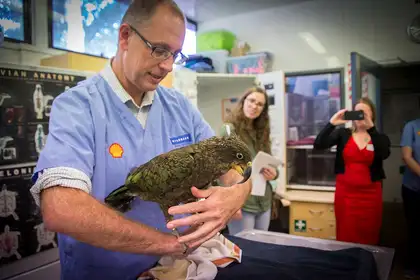
Next week Massey academics will be sharing their unique perspectives of science at the world’s largest series of public science talks – the Pint of Science Festival.
The award-winning international science festival is held simultaneously around the world over three days in May each year. The festival’s success has been expanding globally since its inception in London in 2012 and today spans 300 cities across 12 countries, attracting more than 100,000 people to events.
Over three nights, starting on Monday May 20, the Massey speakers will give talks on a spectrum of scientific displaces at local Palmerston North micro-brewery Brew Union. Topics will range from a Māori perspective of the human body and the universal environment, to the development of bovine anatomy. Tickets can be brought here.
Speakers
Hone Morris and Jeremy Hapeta – Monday, May 20
Hone Morris from Massey’s Te Putahi-a-Toi, will give his talk, Te Taiao, Te Tinana, e rua e rua - Our Body and Planet Earth
“From a Māori perspective the human body and the universal environment are related and the terms used by the ancestors are a testament to that”, Mr Morris says. “My talk will explain this quintessential interrelationship through narrative and terminology, for example the Māori word for land [whenua] is the same word Māori use for the placenta, in that both sustain life.
“I want to offer the crowd another perspective about the world we live in, especially within the Aotearoa context and indigenous knowledge. You should attend if you are interested in Māori terminology that links the universal environment to the human body and the human body to the universal environment.”
Jeremy Hapeta, from the School of Sport, Exercise and Nutrition will give his talk, Rugby and its place in 'our society'
The talk will discuss the findings and results which have emerged from Mr Hapeta’s recently defended PhD thesis: An examination of cultural inclusion and Maori culture in New Zealand Rugby: the impact on well-being.
“The size and shape of contemporary rugby players is a talking point across all ages, sexes and grades. This is a holistic and honest examination of New Zealand rugby from its players to its teams - a down-to-earth, hearty and inclusive presentation that will connect with anyone who’s ever watched, played or connected with rugby,” Mr Hapeta says.
Professor Jon Huxley and Professor Brett Gartrell - Tuesday, May 21
Professor Huxley will give the talk, What have cows ever done for us (and perhaps more importantly what can we do in return)?
“The cow is a truly remarkable yet often underappreciated animal, which has been and remains integral to societies all over the world. In fact without the domestication of farm animals such as the cow, approximately 10,000 years ago, one of the corner stones of the development of static agriculture, it is unlikely our modern societies would have developed. Come and learn more about this amazing animal and their anatomical adaptations which allow them to survive and thrive as farm animals in nearly every environment on the planet,” Professor Huxley says.
Director of Massey’s Wildbase Hospital, Professor Brett Gartrell will give his talk, Kea in trouble: why being smart, inquisitive and hungry has led to the endangered status of a native New Zealand parrot
“There is no such thing as an ordinary person. All of us are different, and this is what has become clear through our research on kea as well. The kea can be described as a species as intelligent, destructive, innovative problem solvers, but we’ve found that the mix of personalities within the kea population has been vitally important in shaping the fate of the species. I’m hoping to communicate the taonga [treasure] of our native wildlife and the challenges they face,” Professor Gartrell says.
“One of the main drivers for me is scientific curiosity, but it’s also linked to trying to achieve real world change. In my work, it’s about the decline of native species and how these animals are adapting to the changing landscape of New Zealand. I want people to know about these special species and care that we are in danger of losing them,” he adds.
Rob Elshire and Dr Simon Hills – Wednesday, 22 May
Rob Elshire will give this talk, So, what do you do?
A thirsty scientist walks into a pub and orders a pint of their finest ale. As they enjoy the pint, a casual conversation about the weather reaches its natural limits. Their new mate asks 'So, what do you do?' This question can cause distress in many scientists. 'I know what I do, but how do I explain it in a way that is relatable and maybe even interesting?' With the help of a volunteer, we will have a conversation about my work in genomics and how this kind of science connects with their life.
Dr Simon Hills, from Massey’s School of Agriculture and Environment, will give his talk, Kiwi whakapapa, genomics and conservation
This talk will tell the story of this question and the partnership that emerged to develop genomic resources for Kiwi populations in Northland. The research aims to generate genetic insight into the whakapapa (genealogy) of these populations to assist local Māori to enhance the kaitiakitanga (guardianship or conservation) of this treasured bird.
“What do we need to know in order to manage populations of endangered species? This is the question that hapū [a division of a Māori people or community] from Rawhiti, in the Bay of Islands, wanted answered about populations of North Island Brown Kiwi living on their whenua [land],” Dr Hills says.